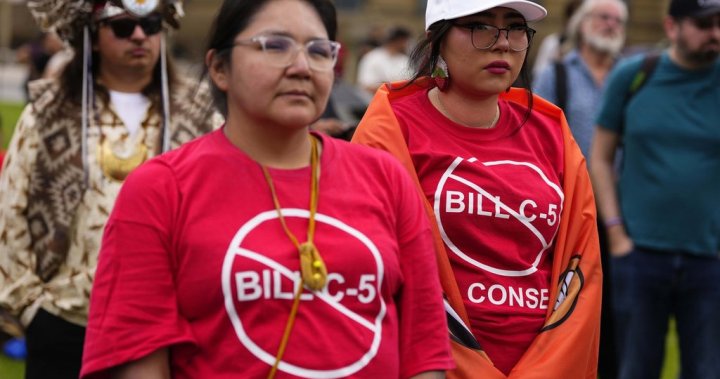Ontario’s First Nations leaders delivered a sharp rebuke to Ottawa this week, calling the federal government’s approach to Indigenous infrastructure development through Bill C-5 deeply flawed and potentially harmful to their communities.
At a special assembly in Toronto, Chiefs from across the province voiced mounting frustration with what they describe as a consultation process that falls dramatically short of the government’s constitutional obligations to First Nations.
“This isn’t partnership – it’s the same colonial playbook with new cover art,” said Ontario Regional Chief Glen Hare during Tuesday’s gathering. “Bill C-5 proposes to create systems that will make decisions about our lands and resources without ensuring our inherent rights are protected.”
The legislation, formally titled the Canada Infrastructure Bank Act Amendment, aims to restructure how major infrastructure projects are delivered in Indigenous communities. Federal officials have promoted it as a transformative approach that would streamline funding and accelerate development in communities facing critical infrastructure gaps.
But Chiefs at the assembly painted a starkly different picture.
“Many of our communities still lack clean drinking water, reliable electricity, and adequate housing,” said Chief Laurie Carr of Hiawatha First Nation. “Before creating new bureaucratic structures, maybe fulfill the promises already made to address these basic human rights.”
The assembly highlighted several core concerns with the legislation. First Nations leaders argue the bill creates new approval mechanisms that could potentially bypass treaty obligations and the duty to consult. They also criticized the proposed funding model as inadequate given the scale of infrastructure needs across Indigenous communities.
Records from Indigenous Services Canada show a current infrastructure deficit exceeding $30 billion across First Nations communities. This includes 31 long-term drinking water advisories still in effect despite the government’s promise to end all advisories by March 2021.
Financial analysts with the Assembly of First Nations estimate that Bill C-5’s proposed funding structure would address less than 8% of current infrastructure needs while potentially creating new barriers to accessing capital.
Minister of Indigenous Services Patty Hajdu defended the legislation in a statement released Wednesday, saying the government “remains committed to working collaboratively with First Nations partners” and that the bill “creates new pathways for Indigenous-led development.”
However, this stance was quickly challenged by Chief Mark Hill of Six Nations of the Grand River, who attended preliminary consultations on the bill.
“I was in those meetings, and calling them consultations is a stretch,” Hill said. “We provided detailed feedback that doesn’t appear anywhere in the current version. True consultation means our input actually shapes the outcome, not just checking a box.”
The dispute represents yet another chapter in the complex relationship between the federal government and First Nations. Prime Minister Justin Trudeau came to power in 2015 promising a “renewed nation-to-nation relationship” with Indigenous peoples, but critics say this commitment has yielded mixed results at best.
Recent polling from Abacus Data shows 67% of Canadians believe the federal government has not made significant progress on Indigenous reconciliation, with infrastructure gaps frequently cited as evidence of this failure.
The assembly passed a resolution demanding the federal government pause Bill C-5’s progress through Parliament until a more robust consultation process can be established. Chiefs are requesting direct negotiations with Cabinet ministers and technical teams to address the legislation’s shortcomings.
“We’re not opposing development – we’re opposing being developed without our consent,” explained Chief Melvin Hardy of Biinjitiwaabik Zaaging Anishinaabek. “Our communities desperately need investment, but on terms that respect our sovereignty and our vision for the future.”
The Chiefs are particularly concerned with sections of the bill that would create a new Indigenous Infrastructure Authority with broad powers to approve projects but limited requirements for First Nations governance representation.
Parliamentary records show Bill C-5 is currently scheduled for second reading next month, though government sources speaking on background suggest there may be openness to amendments following this week’s pushback.
Economic analyses from the Canadian Centre for Policy Alternatives indicate that addressing First Nations infrastructure needs could generate significant economic benefits, potentially creating over 100,000 jobs nationally while improving living conditions in communities with some of Canada’s youngest and fastest-growing populations.
“The irony is that we actually want the same outcome as the government – sustainable, resilient communities,” said Regional Chief Hare. “But the path to get there can’t bypass our rights. That’s a lesson Canada should have learned by now.”
As federal legislators prepare to debate the bill, Ontario Chiefs have made it clear they expect substantial changes before lending their support to any new infrastructure framework.






